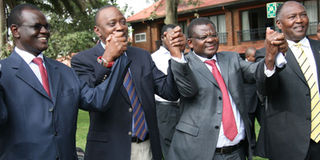4 parties strike pact to support Uhuru in polls

From left: APK secretary general Kiraitu Murungi , Deputy Prime Minister Uhuru Kenyatta, Finance minister Njeru Githae and Gema's Stephen Karau in a show of solidarity after a meeting at the Norfolk Hotel, Nairobi. Four parties pledged to support Mr Kenyatta's presidential bid August 8, 2012. JENNIFER MUIRURI
Deputy Prime Minister Uhuru Kenyatta on Wednesday won the backing of three political parties, including the Party of National Unity, in his bid for the presidency.
PNU, Grand National Union headed by assistant minister Mwangi Kiunjuri and the Alliance Party of Kenya of Energy minister Kiraitu Murungi and Mr Kenyatta’s The National Alliance, signed a coalition agreement to support his candidature in the next elections.
The agreement is a culmination of months of negotiations among the parties which have been spearheaded by Mr Murungi, whose party, known as the “Bus” in political circles, was without a presidential candidate.
The agreement, however, does not mean that PNU, GNU and APK will not field candidates for other seats.
It states that together with TNA, they will form a majority party on whose ticket they will hold joint nominations and support the candidates who will emerge the victors.
The coalition agreement at the Nairobi’s Norfolk Hotel on Wednesday was signed by Mr Kenyatta for TNA, Transport minister Amos Kimunya (PNU), Mr Murungi (APK) and Mr Kiunjuri of GNU.
The ceremony was also attended by Finance minister Njeru Githae, APK chairman Titus Imbui and Gema’s Dr Stephen Karau.
The coming together of the four parties left Narc Kenya’s Martha Karua, assistant minister Peter Kenneth of the Kenya National Congress and Safina’s Paul Muite as the only presidential aspirants from Mt Kenya region in the State House race on their own.
The three have vowed to go it alone all the way to the ballot box.
In signing the agreement, the four parties gave Mr Kenyatta the task of holding talks with like-minded alliances and parties with the aim of forming a grand coalition for the purposes of elections and after.
Talk to other leaders
“We hereby resolve and agree to support the presidential candidature of Uhuru Kenyatta. We also mandate and empower Uhuru Kenyatta to enter into negotiations with like-minded parties to ensure that the coalition wins the forthcoming General Election,” the leaders said in the agreement read by Mr Githae.
Mr Kenyatta said he accepted this role and would lead the four parties in joint rallies as he seeks discussions with other leaders.
Though he did not specify who he would be speaking to, Mr Kenyatta said he would continue to pursue his relationships with other leaders in the G7 Alliance.
“This to me is a beginning that shows that we are conversant with the new political parties Act and I strongly believe that with this beginning, within the time limits given by the law, we shall be able to put together a cohesive, strong and undoubtedly winning combination to take on whoever shall be our opponent in the forthcoming election,” Mr Kenyatta said.
The DPM has been holding talks with Justice minister Eugene Wamalwa on the possibility of them seeking the presidency on a joint ticket.
The two are expected to announce their formal alliance before the end of the month.
Mr Kenyatta is also part of the G7 Alliance, which brings together other leaders, including Eldoret North MP William Ruto of URP, Vice-President Kalonzo Musyoka of Wiper Democratic Party and Trade minister Chirau Mwakwere also of URP.
Mr Murungi has been insisting that time was running out for parties allied to Mr Kenyatta to come together.
On Wednesday, the Energy minister said he was delighted with the new alliance and urged supporters of the four parties to work together.
The agreement also asks the four parties to establish coalition structures from the ward level as well as “combine and pool their resources and have joint structures, common policy agenda and run joint campaigns.”
“We have agreed to support and commit to one common manifesto, policy agenda and programme of action to be implemented by the next government,” Mr Githae said.
The agreement also lays emphasis on issues relating to women, the youth and marginalised groups as the key priorities for the coalition. It also prioritises cohesion and national unity.




